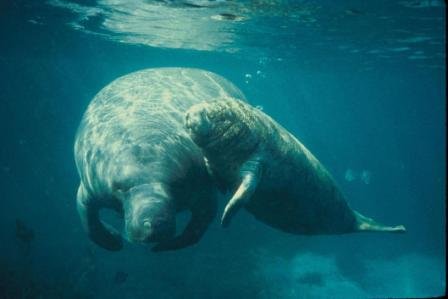For Immediate Release, February 16, 2023
|
Contact: |
Ragan Whitlock, (727) 426-3653, rwhitlock@biologicaldiversity.org |
18,000 People Urge Federal Officials to Boost Manatee Protections
Petition Would Restore Endangered Status for Imperiled Animals
ST. PETERSBURG, Fla.— The U.S. Fish and Wildlife Service received more than 18,000 letters today supporting a petition to increase protections for West Indian manatees. The imperiled animals have been dying in record numbers in Florida waters.
The petition asks the Service to move manatees from threatened to endangered status under the Endangered Species Act. It was filed in November by the Center for Biological Diversity, Harvard Animal Law & Policy Clinic, Miami Waterkeeper, Save the Manatee Club and Frank S. González García. The Service must respond by Feb. 20, 2023, with an initial determination.
“This overwhelming public support proves that people back stronger Endangered Species Act protection for our iconic manatees,” said Ragan Whitlock, a Florida-based attorney at the Center for Biological Diversity. “The Fish and Wildlife Service has to reverse its lethal decision to downlist these animals, who are now starving to death because of pollution. Protecting these incredibly imperiled creatures as endangered would help put them back on the path to recovery.”
Since the Service prematurely reduced protections in 2017, the species has declined dramatically. Pollution-fueled algae blooms sparked an ongoing mortality event that killed nearly 2,000 manatees in 2021 and 2022 combined. This two-year mortality record represents more than 20% of all manatees in Florida. Manatee experts predict that the animals will continue to suffer high levels of malnourishment and starvation.
Unchecked pollution — from wastewater treatment discharges, leaking septic systems, fertilizer runoff and other sources — is fueling the collapse of the Indian River Lagoon, leading to the unprecedented mortality event. A 2021 study also found more than half of sampled Florida manatees are chronically exposed to glyphosate, a potent herbicide applied to sugarcane and aquatic weeds. Discharges from Lake Okeechobee containing glyphosate have also resulted in higher concentrations of glyphosate in the Caloosahatchee and St. Lucie rivers.
Boat strikes are another leading threat to Florida manatees. On average, boaters kill more than 100 manatees in Florida every year. This number is expected to increase as Florida’s population continues to expand. In response to a petition from the Center for Biological Diversity, Florida Springs Council and Suncoast Waterkeeper, the Florida Fish and Wildlife Conservation Commission has finalized a rule to increase boater awareness of manatees and other coastal wildlife through boater education. However, not all boaters are currently required to take the education course.
After receiving the uplisting petition on Nov. 21, 2022, the Fish and Wildlife Service had 90 days to evaluate whether the petition to protect the manatee as endangered presents substantial information to indicate that the petitioned action may be warranted. If the Service determines uplisting may be warranted, it must complete a thorough review of the species’ status within 12 months of receiving the petition.
Originally listed as endangered under the Endangered Species Act in 1973, manatees have never truly recovered. The Fish and Wildlife Service announced its final rule downlisting the West Indian manatee from endangered to threatened on March 30, 2017 — despite hundreds of manatees still dying each year from boat strikes, habitat loss and other causes.

The Center for Biological Diversity is a national, nonprofit conservation organization with more than 1.7 million members and online activists dedicated to the protection of endangered species and wild places.

